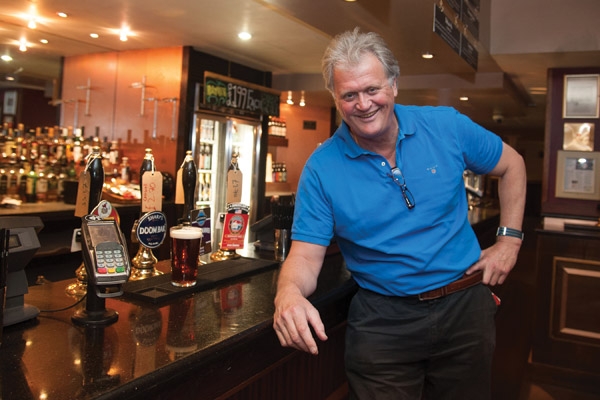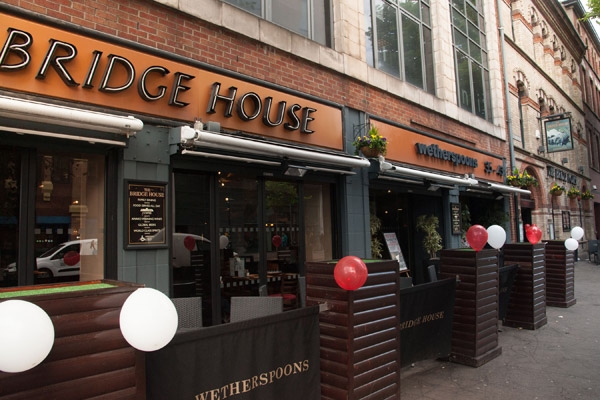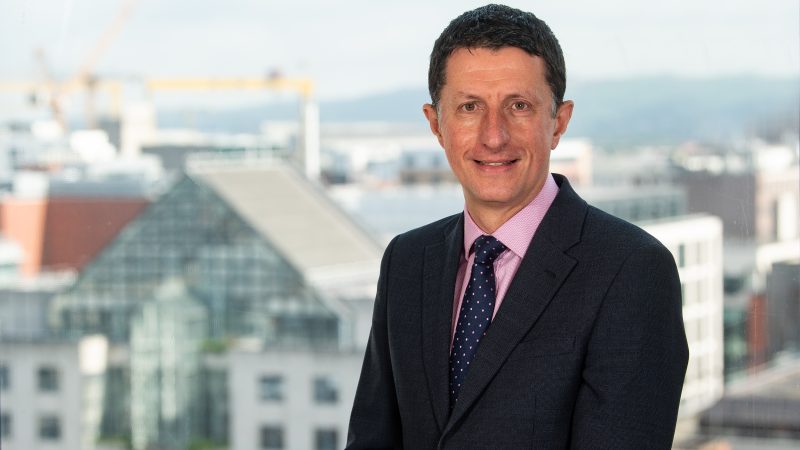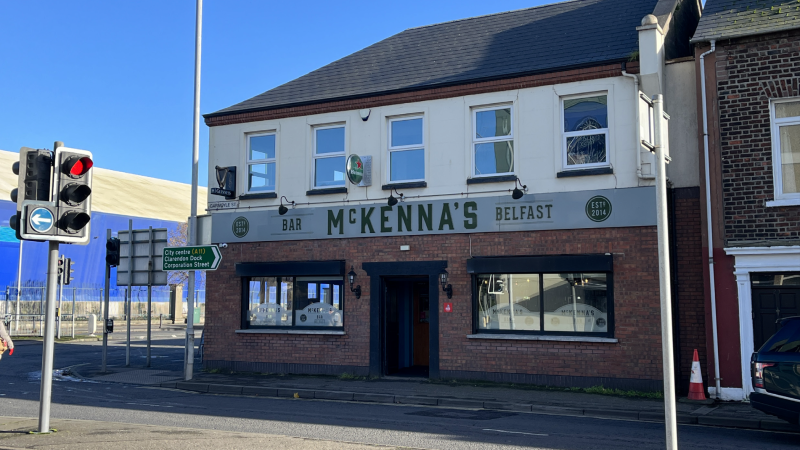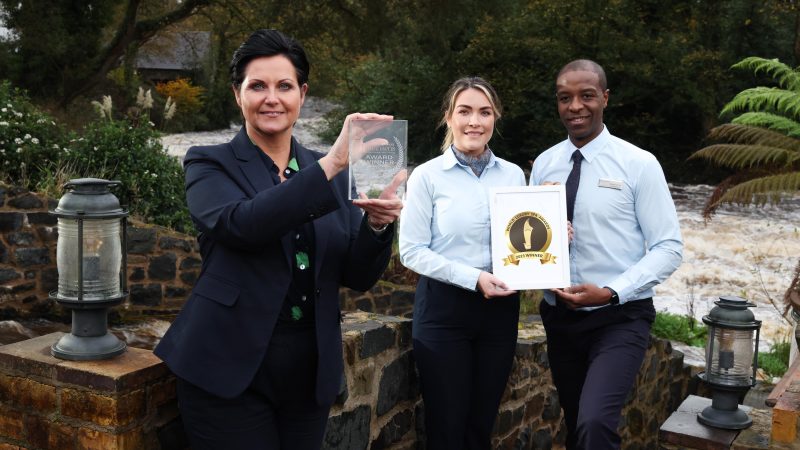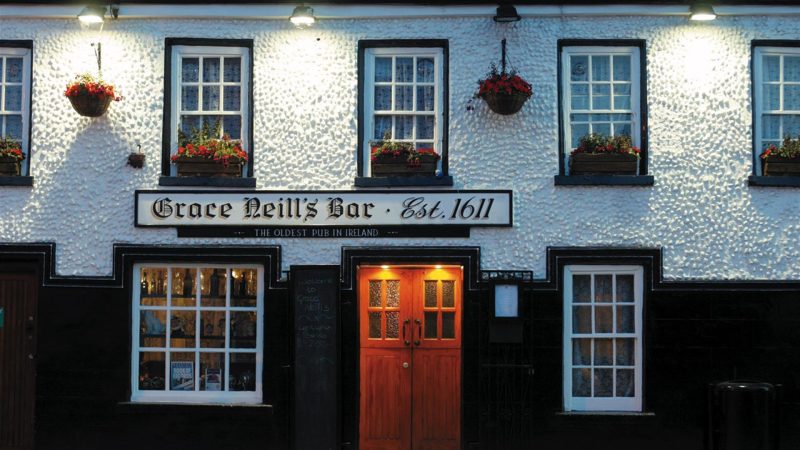All the little things
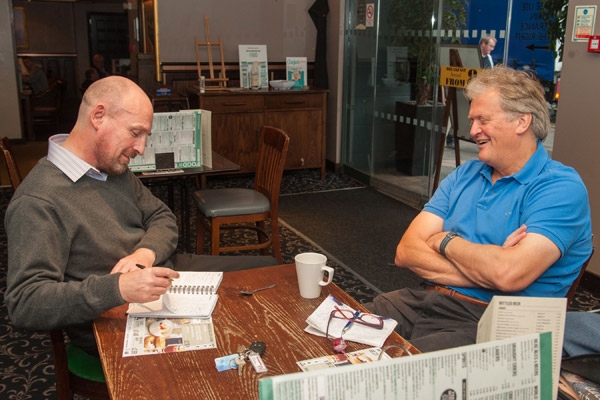
Wetherspoon’s CEO, Derry-born Tim Martin was back in the province recently for one of his frequent visits to the chain’s premises here. He met Russell Campbell at The Bridge House in Belfast to explain why he still believes in the personal touch.
Tim Martin is one for the fine detail. He quotes British cyclist Dave Brailsford’s credo about the “aggregation of marginal gains” in order to explain his obsession with experiencing his multi-million pound pub business from the perspective of its customers.
“It’s a good place to start,” he says simply. “If you ask staff in most companies what their biggest gripe is, they’ll say that it’s lack of recognition.”
Ulster-born Martin is the co-founder and chief executive of UK pub and hotel chain, JD Wetherspoons and each week, he still insists on visiting around a dozen of the group’s outlets all over the UK – that’s more than 600 personal calls every year.
At 6’ 5”, he cuts an unmistakeable figure as he sips tea by the window in The Bridge House, the chain’s flagship NI bar in the centre of Belfast. The nonchalance is unaffected- it’s not some variety of ‘deep cover’ mystery shop – it’s simply what Martin does, it’s a big part of the way he manages the group and its difficult to argue with the results.
Last month’s preliminary figures show like-for-like sales across the chain’s 900+ pubs have increased by 5.5 per cent; total takings are up by 10 per cent to £1,409.3m and like-for-like bar sales have increased by 2.7 per cent.
In Northern Ireland, Wetherspoon’s now has nine outlets – it opened its first in Ballymena in 2000 – but it may soon have 10, following reports that it’s eyeing up a former sports store in the centre of Belfast. Martin, however, dismisses that speculation as “pie in the sky”, admitting only that the chain is “looking at a couple of premises”.
It’s vindication of an approach that was considered peculiarly English when the chain first arrived in Northern Ireland. Its focus on craft beers and its all-day food offering set it aside from its high street competition at the time and its refusal to have music, televisions or gaming machines in its bars – not to mention its pre-ban prohibition on smoking – left many doubting if the newcomer could survive in the competitive local market.
It has thrived, however, and this year saw it move across the border when it opened its first bar – The Three Tun Tavern – at Blackrock in Dublin. A second outlet has since opened in Cork and a third will open at Dun Laoghaire before the end of the year.
“Someone told us that opening in Northern Ireland would be different and that we should put music into our pubs here,” recalls Martin. “We did that, but it wasn’t quite us really and so we took it out again.
“I think that any business, whether it’s a newspaper or a car-maker or a brewery, it has to have its own identity to some extent. So perhaps the identity that we have is an important part of our success but personally, I think that it’s more to do with the improvements that we’ve made to service and to staff over the years, the large amount of small changes that we’ve made have been the determining factor.”
Tim Martin’s parents went to school in Dungannon, although his father, Ray, was born in England. Ray worked for Guinness for more than 30 years, so it’s ironic that the chain founded by his son isn’t selling the iconic Irish drink over the bar at its Blackrock outlet, following a disagreement over price points with brewer, Diageo.
Tim lived in Derry for three years between the ages of six and nine while his father was a rep for Guinness, then he moved to Belfast when his father became marketing manager. Ray then moved overseas for most of the rest of his career, but he did return to Belfast in 1970 for a three-year stint and 15-year-old Tim was sent to Campbell College.
After spending a large part of his life in New Zealand, Tim speaks with a pronounced accent and harbours an abiding love of surfing. When he goes out socially for a drink, he tries to frequent pubs other than Wetherspoon’s outlets and is particularly fond of The Churchill Arms in Kensington.
Unlike many in the licensed trade, his pub chain has been doing rather well since 2008 and the last 18 months have seen gains of almost 40 per cent. Poorer than expected trading during the World Cup led to a few jitters, but the company’s share price has held and an aggressive programme of new pub openings will continue next year with around 40 new premises in the pipeline.
As far as Martin is concerned, the biggest danger to the pub industry in the UK generally is the VAT disparity between the licensed trade and supermarkets. Wetherspoon’s supported the Tax Equity Day initiative during September when some of its outlets in GB cut the price of all food and drink by 7.5 per cent for the day to highlight the issue.
At present, all food and drink in pubs is subject to 20 per cent VAT, compared to supermarkets which benefit from a zero VAT rate. Martin says that by reducing VAT long-term, the government can create jobs and generate growth in the sector. It’s a message that chimes well with the trade in Northern Ireland, where hospitality faces the additional hurdle created by a significantly lower rate of VAT for competitors just over the border.
“Unlike in England, all the supermarkets arrived here [in Northern Ireland] in a big swoop 20 years ago and took the wind out of the sails of the pub industry,” Martin tells LCN. “They have tax advantages and a lot of what is wrong with the industry today has to do with that. As a result, they are able to subsidise the price that they sell beer at and a supermarket with the same sales volume as Wetherspoon’s would pay almost £100m less in VAT payments per year.”
Liberal
Publicans in Northern Ireland should “beware of so-called liberal legislation”, warns Martin, referring to ongoing plans for changes to the regulations here. “We had that in England and really, it was the opposite of what we wanted. I think that rather than ask for blanket legislation, it’s better for licensees to identify those things in existing legislation that they don’t like. For example, licensing here allows for opening from 11.30am, but I think many tourists might find that a bit weird. Germans like a brandy with their breakfast and whatever, and starting to serve at 10am rather than 11.30am isn’t going to cause mayhem on the streets of Northern Ireland.”
He thinks people need to be able to make their own minds up about how they socialise on religious holidays such as Easter, he adds, but closing the pubs at 10pm on Good Friday doesn’t stop people drinking, they simply buy their alcohol earlier in the day and put it in the fridge.
“The real problem here is the same across the UK and it comes back to the supermarkets,” adds Martin, although he goes on to concede that he doesn’t feel confident enough to comment specifically on what might make life easier for publicans in the province:
“I don’t think there’s any magic formula, everybody is looking for it, but really it just comes down to graft and to the morale of your staff,” he says. “The difficulty with running a pub is that people hate clones, they like individuality. It’s a complex point, but a successful pub has to have characteristics that people are able to identify with, they like to have that element of certainty…people may drink in Wetherspoon’s because they know there’s no music or because they know that even at 5 or 6pm, there is going to be food available.”
One of the best bits of business advice Martin ever received came from Captain Beefheart – “Keep on walking and don’t look back” – “But it’s more the ‘keep on walking’ bit,” he says.
“My priorities are all the same old things, really, trying to increase the range of craft beers that we do, trying to make sure that we retain the best staff and upgrade the facilities in our pubs, lots of little things really.”
Five years from now, he hopes there will be more Wetherspoon’s pubs in Northern Ireland, that they’ll have hung on to their good staff and that more people will be drinking in their pubs. But all of this can only happen, he warns, if tax equity with the supermarkets can be achieved.
“It’s hard to say exactly how the future will look for us, much will depend on how things go in the places where we already are, but if the trade continues to improve as it’s doing now, then there’s no reason why we won’t be able to open a few more…”


